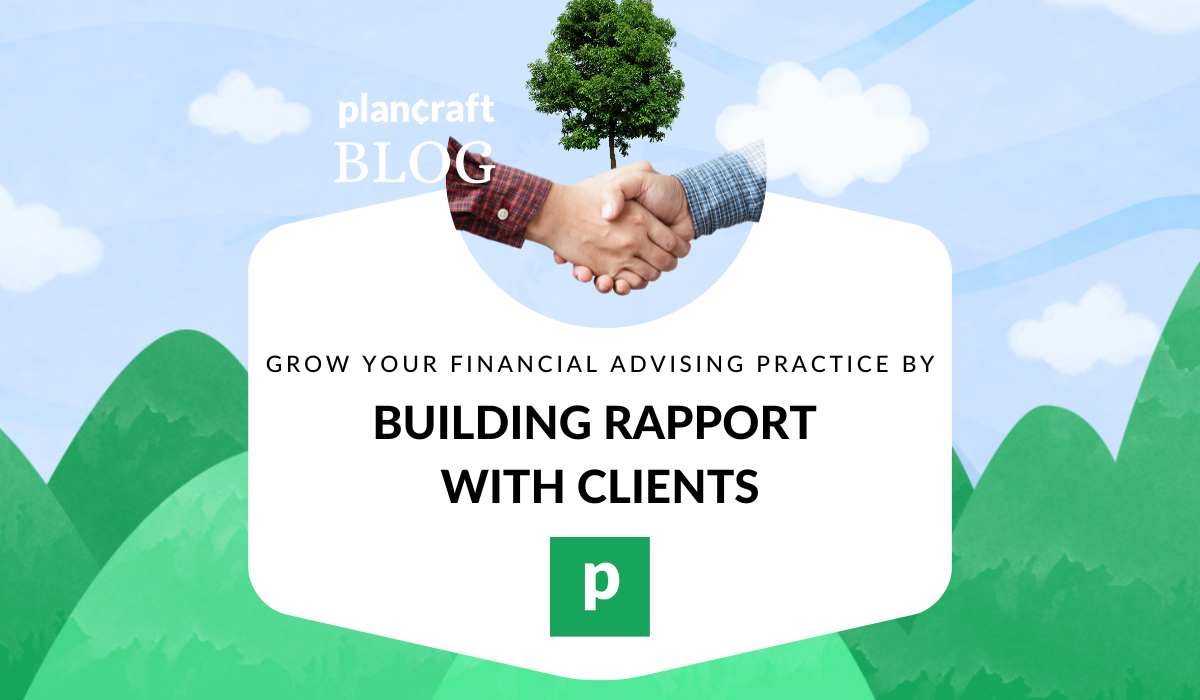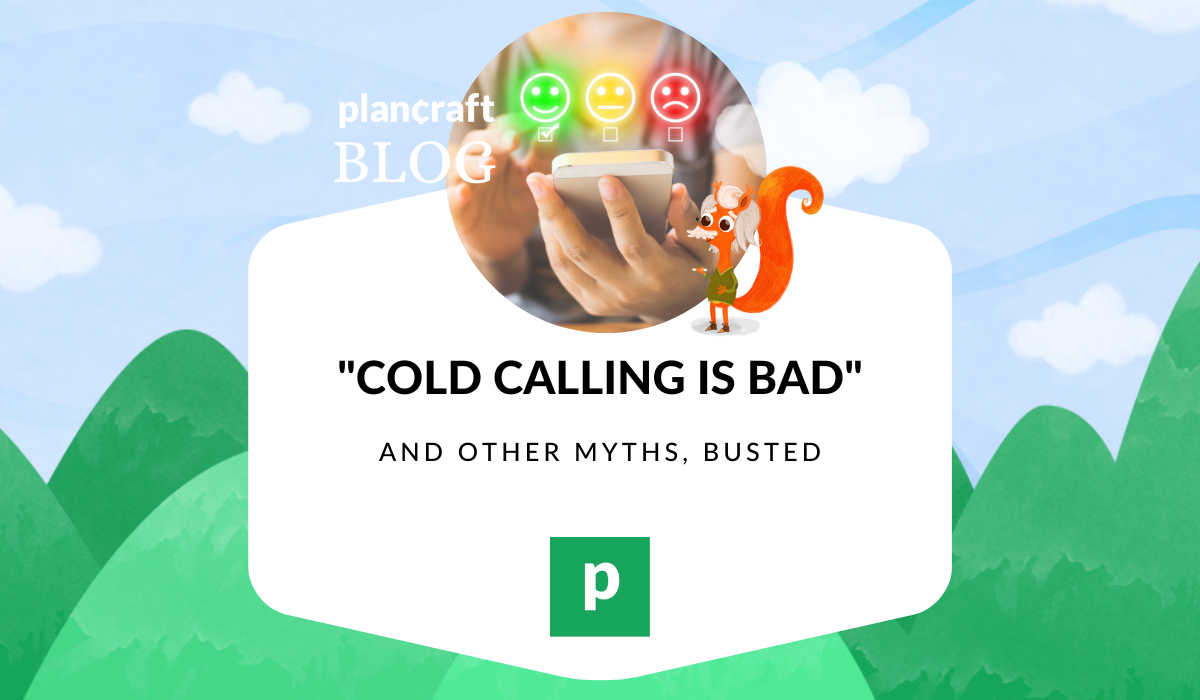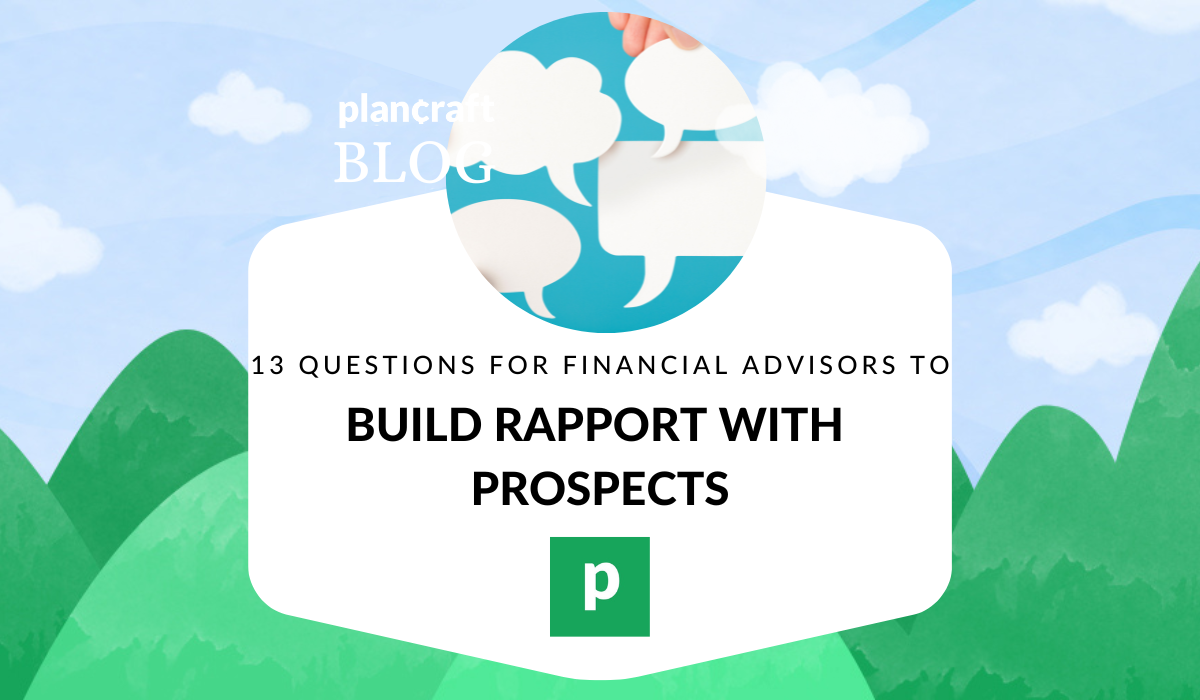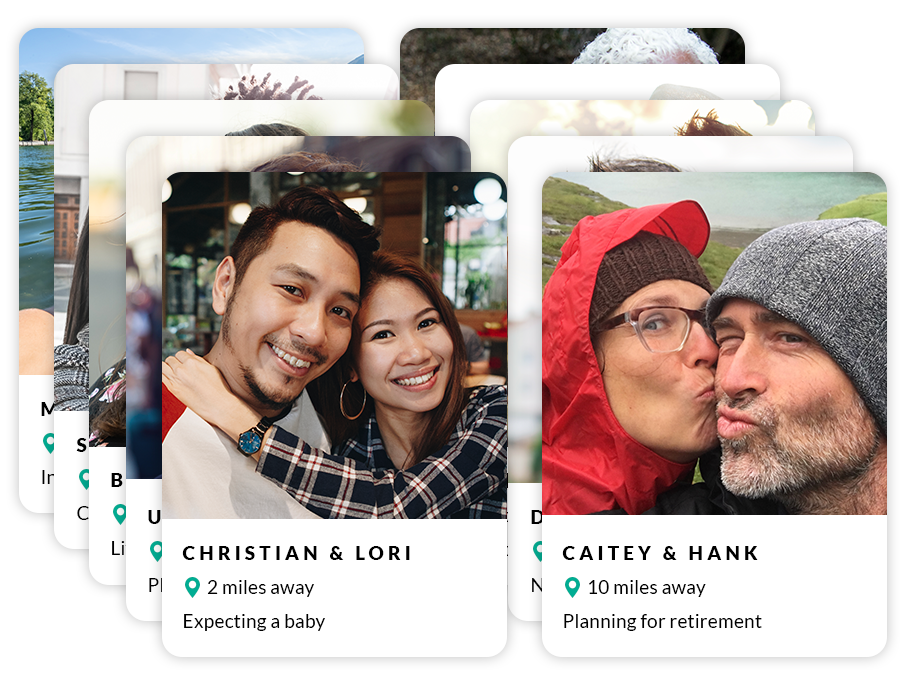If your muscles tense up at the mere mention of phrases like "eye contact," "active listening," or "relationship," the thought of rapport building with clients might be the kind of thought that keeps you up at night, sweating.
And yet, if you want to have any hope of organically growing your financial advising practice, you're going to need to develop rapport with the clients you earn. In fact, even if all you want to do is maintain the book of clients you already have, it's going to be absolutely essential.
Don't worry though: this actually doesn't involve having heartfelt, vulnerable conversations with people you don't even know. In fact, if you do it right, it can be one of the more fun and exciting parts of your practice.
Keep reading and we'll break down the concept of building rapport, from why you should do it to how to best execute it with new and existing clients.
Why is building rapport so important?
As a financial advisor, building rapport is especially essential because your job is to help folks manage their money so they can meet their long- and short-term financial goals.
Doing so requires earning quite a bit of trust and respect from your clients, and people don't tend to trust or respect folks they don't feel comfortable engaging with.
The primary goal here is to convince your clients that you care about their financial success, rather than your bottom line; that you're there to be of service to them, not just to yourself.
If you can do this successfully, if your clients truly get the sense that you're there as their advocates and are doing everything in your power to help them meet their goals (because, of course, you are), you will not only earn their business for life, but they will also refer their friends and family to you as well.
How do you establish rapport with new clients?
Your first conversation with a new prospective customer might have the tendency to steer itself towards awkwardness, as anyone who's ever been on a first date can attest to.
You don't want that, though.
You want to start your relationship with this potential client off on a positive note, and that means establishing rapport right off the bat.
Here are a few rules you can follow to make sure those initial customer calls are not only enjoyable, but build good rapport too.
Be authentic
Your parents and teachers and mentors have probably been telling you to "just be yourself" since before you were old enough to build lasting memories.
It turns out (in this case anyways) they were right.
Most people have a highly-tuned internal BS detector that is in full operation, especially when engaging for the first time with someone who they're pretty sure is going to try and sell them something. If you want to make a good first impression, you'll need to ensure you don't set that BS detector off.
Being yourself is a great way to develop rapport because, when you are genuine and authentic, your clients will notice, and be more likely to engage with you. When this happens, your initial meeting should feel more like a casual, personal conversation and less like...well, a first meeting between a financial advisor and a potential client.
Selective self disclosure is another great strategy to demonstrate your authenticity and help build mutual understanding. Sharing stories of your own success, how you learned from failure, or even your love of the local sports team is a great way to start to establish rapport with a client.
Listen actively
Active listening skills (also known as "reflective listening") are essential, not only if you want to build rapport with your clients, but also if you want to provide great service to them.
First of all, your clients will notice and appreciate that you're actively listening if you're actually doing it. Second of all, doing so will help you provide the best service possible, because you'll retain more information from your conversation which you can use to serve clients' nuanced and specific needs.
Here's a few active listening skills you should have in your toolbelt to pull out and use at every possible opportunity:
Body language
If you want to make a positive first impression at your initial client meeting, your body language should convey your excitement and interest in engaging with this person about their financial goals and needs.
You should be making eye contact and sitting with your back straight; your facial expression should read as "interested" rather than "bored," and it should be fairly clear that you are doing something (e.g. taking notes) to retain the important details of what your client is telling you.
Rephrase & Summarize
In order to demonstrate that you are a good listener who is in tune with your client's feelings, you should take the time to reiterate what they've told you in your own words. This will not only demonstrate you care enough to take the time to make sure you do things right, but also ensure you have an accurate understanding of their needs.
Ask follow up questions
If the client ever says something that confuses you, or you don't understand, ask them to reiterate it. Not only will this help you develop effective communication, it will also make them feel valued. If you care enough to ensure you understand them, the client sees that you've got their best interests at heart.
You should also ask follow up questions that show your genuine interest in and curiosity towards their lives, not only when you need to ensure you got the correct information.
Engaging in authentic small talk like asking a client to tell you more about their trip to Croatia, or share photos of their cute dog will not only help transform your "business meeting" into a more casual conversation, but it will improve the client's mood and help to paint the experience of working with you in a more positive light.
Recognize and respond to nonverbal cues
Just as your client will be noticing and feeding off of your body language, so should you be paying attention and reacting appropriately to theirs.
If you can tell that a particular topic is making a client feel uncomfortable, you should acknowledge that and change the subject. You might also notice a client seems particularly interested in a different topic, which is your cue to dig deeper.
Display empathy
Don't get nervous: we're not going to tell you to be "in tune with your feelings" or to "share vulnerably" here or anything like that. In fact, phone sales expert Mary Jane Copps (a.k.a. "The Phone Lady") has a very different perspective on the concept of empathy.
True empathy, she argues, is really just recognizing how a client is feeling and demonstrating understanding. If the word "feeling" is still sending you into miniature conniptions of anxiety, that's okay — replace it in your mind with "situation."
The template here is actually quite simple. First, you notice how your client is feeling, and then you validate it: "I can see you're feeling _______. I get it."
You don't only want to display empathy when encountering angry customers either. You want every single client to know in their hearts that you understand them and want to help, and showing empathy is the way to make that happen.
Find common ground
Of course the most important topic of conversation with a new client is the business end: their finances. However it's also important to engage in some low-stakes, casual chit-chat in order to build a connection with clients.
If you live in the same community or region as this client (which, if you're working with Planswell, is guaranteed), there's a veritable treasure trove of conversation topics you can use to foster connection and build your relationship with them.
Favorite restaurants, local sports, community events (like festivals and shows), and even the weather are all avenues you can use to drive towards authentic connection with a new customer.
(Side note about the weather suggestion: don't just say "crazy weather we've had this week, huh?" — that's a terrible question. Instead, use it as a means of learning more about your customer, for example "what did you do with all the great weather this weekend?")
Provide value
At the end of the day, a customer is going to want to give you their business only if they have confidence that you're going to be able to provide them value.
So, at the end of all you've done to learn about this person, you need to show them how you'll be of value to them. How can you help them retire sooner, or with more money? What can you do to help them ensure they'll be able to afford their kids' educations, or be secure in the event of some sort of family emergency?
Providing this value is easier the more information you have about a client, which is a part of why building rapport with clients is so dang important — it's how you gather that information.
Of course, if you work with Planswell households, you already have more than 40 data points you can use to generate solutions to problems the households may not even have been aware of, which of course makes this step a whole lot easier (though you'll still need to build rapport with clients from Planswell if you want to earn their business).
How do you build rapport with existing clients?
Your relationship with a client doesn't end when they agree to give you their business. Not even close.
In fact, as a financial advisor, you should continue to engage clients as a way of reminding them that they like working with you and that you will be of excellent service to them.
Here's a few helpful tips to make sure that you continue to build rapport with clients well beyond the moment they agree to work with you.
Communicate regularly
Basically the last thing you want a customer to do is forget you exist.
However, the second-to-last thing you want a customer to do is remember you exist because you're annoying them with communication that doesn't matter.
So, what do you communicate about?
Update
Providing customers with consistent updates about how their investments are faring is an excellent way to keep them engaged and thus maintain your relationship with them.
The key to doing this correctly is to ensure that when you send customers updates, there's valuable information in them.
You also want to make sure that you're not sending updates so often that they become bothersome. How often that is depends on each client, of course, and one customer may ask for weekly updates whereas another may only want them quarterly, or never at all.
Asking how often a customer wants you to check in on their finances is an excellent idea: it will show them you're willing to tailor your practice to their needs, which (guess what) builds rapport.
Educate
Some of your customers may be interested in more than updates about their financial health. Sending them reading material that will help educate them on financial matters and make them more financially literate is another way to maintain your relationship in a way that shows you have their best interests at heart.
You could write your own blog to send to your customers, but why do that when we have a perfectly good one you can use? We publish weekly on all sorts of helpful financial topics that your customers will be sure to appreciate.
Celebrate
You don't have to throw a pizza party for every customer that reaches an important financial milestone (though you could, within reason), but celebrating your customers' victories is just one more way to show you care.
What customer wouldn't want to get a card in the mail congratulating them on reaching their emergency fund financing goals (perhaps with a Starbucks gift card inside)?
Ask for feedback
One of the best ways to maintain strong connection with your customers and instil confidence that you're working to make them successful is to ask customers for feedback.
How could you be of more service to them? What communication would the like to receive that they aren't? What communication are they receiving they wish they weren't?
Implementing customer feedback — potentially at your own expense — will build trust that you're here for the customer, not yourself, which is absolutely key if you want to maintain your book of business for a long long time.
Engage
We mentioned celebratory pizza parties, but why gatekeep the fun for those who meet certain milestones?
Throwing a quarterly party for all of your clients is actually a relatively inexpensive way to get to know each customer better as a person, which will absolutely help you maintain relationships with them.
It doesn't even have to be a party either: buying a section out for a local sporting event, renting out part of a bowling alley, or even setting up a (potentially financial themed) trivia night at a local restaurant or bar are all excellent options that won't cost you all that much and people will actually want to come to.
The Gist
Every person you interact with that you hope to become your customer, or continue to be your customer long-term, needs to have the confidence that their experience working with you is going to be positive.
That means building rapport with clients is an essential part of any financial advisor's business. It also happens to be the case that maintaining positive relationships with your customers can be fun and exciting too.
Whether you're engaging in authentic, honest conversations or bringing your clients together for a fun hang out session, having enjoyable interactions with the people you work with is what rapport-building is all about.
And, at the end of the day, who wouldn't want to do that?
Building rapport FAQs
What are the 4 elements of rapport?
"Rapport" is basically synonymous with "relationship." So, what we're really discussing is developing positive relationships with people.
In reality, there are far more than four elements that make up any sort of positive relationship, however in the sales world, the four elements of rapport are often described as empathy, authenticity, similarity, and shared experience.
What are 3 things you do to build rapport with a prospective client?
We would argue there are more than three things you should do in order to build rapport with a prospective client, but if we had to narrow it down to the three most important ones, we'd go with the following list:
-
Listen actively
-
Be authentic
-
Find common ground
What is the main purpose of building rapport with clients?
Investing time and energy in building and maintaining strong, positive relationships with your customers is important because you want them to stay your customers and you want them to refer their friends and family to you as well.
Nobody is going to continue working with someone they don't have a positive relationship with, and they sure as heck won't be recommending other potential customers to you.
So, if you want to grow or even maintain your customer base, you'll need to be building rapport with your clients.









